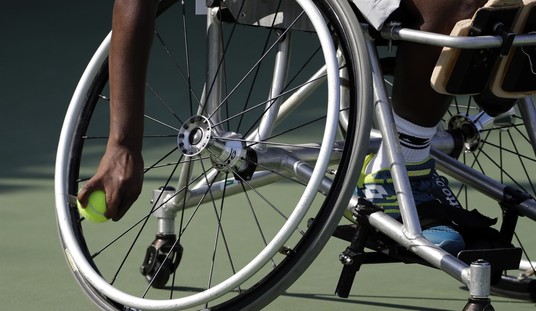The five-year farce known as the “Ergenekon” trial – Turkish Prime Minister Recep Tayyip Erdogan’s purge of military and political opponents under the cloak of an “anti-terrorism” prosecution – is now completed. On Monday, a special court pronounced the convictions and harsh sentences – ranging from decades of incarceration to life-imprisonment – for dozens of the 275 defendants (66 of whom have already been languishing in prison for some time).
As expected, Erdogan’s ruling Islamic-supremacist party (the AKP) is hailing the trumped-up result as a triumph for “democracy” that strengthens civilian control of the military – many of the accused, including former army chief of staff General Ilker Basbug (sentenced to life imprisonment), having allegedly plotted to overthrow Erdogan’s government. But, as Der Spiegel reports,
[T]he evidence was questionable, and in some cases non-existent. The government hasn’t targeted a small, secret group of conspirators but half the military leadership. Many author, journalists, lawyers, businesspeople and opposition politicians are in jail. Erdogan, many critics are convinced, is waging a witchhunt against his political opponents….
The story that Ergenekon was part of an even greater conspiracy called “Deep State”– aimed at bringing the generals back to power — has become steadily less credible. Erdogan, who has been in power since 2003 and who won a third term in july 2011, increasingly resembles a power-obsessed ruler bent on silencing all opposition. Critics say his aim isn’t to submit the military to democratic rule but simply to cement his own grip on power.
The intimidation and the number of arrests has steadily risen in the last 10 years. Many journalists no longer dare to report what’s really happening, authors avoid making public appearances and government critics need bodyguards. The anti-terrorism law is an effective instrument of power for the government as the supposed terrorist threat is an accusation that’s hard to disprove.
Nor do Monday’s verdicts come in a vacuum. As the Guardian notes, last year more than 300 military officers were sentenced to jail in a case dubbed “Sledgehammer,” involving similar charges of plotting to overthrow Erdogan a decade ago.
My book Spring Fever: The Illusion of Islamic Democracy examines Erdogan’s Turkey at some length, making the case that Islamic supremacists regard “democracy” merely as a method to impose sharia on Muslim majority countries without violence. Ergenekon and Sledgehammer are classic examples of why, for all their “democracy” bluster, Erdogan and his ilk are anti-democrats who regard their police power not as the guarantee of the rule of law necessary for a free society to thrive but as a truncheon for oppressing dissenters into silence and submission. As Spring Fever recounts:
Shortly after the election [won by Erdogan’s AKP in 2007], an AKP government prosecutor very publicly accelerated a sweeping investigation of an alleged terrorist network, labeled “Ergenekon.” This shadowy enterprise is depicted in the Islamist media as the dark force behind seemingly every criminal act in Turkey since the dusk of the Cold War. That includes the deep state’s vicious operations against separatist Kurds, its reputed collaboration with criminal syndicates, and its elaborate spying on Islamists. [The deep state is the term for the military, political and judicial elites who were guardians of Ataturk’s secular order.] As Gareth Jenkins recounts in an analytical essay published by the Middle East Review of International Affairs, the pro-AKP press has sedulously fanned the flames, based on illegal government leaks (torrents would be a better word), to sear Ergenekon on the public consciousness as “synonymous with the deep state.”
The only problem is: There’s no there there. Ergenekon is a monstrous ruse, a transparent vehicle for arresting, imprisoning, harassing and intimidating the regime’s political critics and adversaries. Jenkins shows that among the hundreds detained are “university rectors, lawyers, journalists, television presenters, the author of some erotic novels, retired generals, the head of the Ankara Chamber of Commerce, and even Turhan Comez, a dissident former parliamentary deputy from the [AKP] who had resigned in 2007 in protest [over …] Erdogan’s authoritarian management style.”
The regime’s prosecutors have filed thousands of pages of allegations – a single indictment, charging 86 people in 2008, is 2,445 pages long. They accuse suspects of membership in “an armed terrorist organization” and of “inciting people to the armed rebellion against the government of the Turkish Republic.” On close scrutiny, however, the charging instruments are incoherent, shot through with anachronisms and internal inconsistencies. They do not establish that such a thing as Ergenekon even existed, much less that the legions of accused defendants actually joined the fanciful conspiracy, which purportedly sought to control every terrorist organization not only in Turkey but in the world – and the indictments keep coming, so the eventual inclusion of outer space can’t be ruled out.
If I were writing this in Turkey, I’d likely need to complete the next chapter in a jail cell. As Kemal Kulicdaroglu, the leader of AKP’s main opposition wrote in in a 2012 Washington Post op-ed, “The AKP is systematic and ruthless in its persecution of any opposition to its policies. Authoritarian pressure methods such as heavy tax fines and illegal videotaping and phone tapping are widely used to silence opponents.” For criticizing the judges and prosecutors of this “Islamic democracy,” Kulicdaroglu, naturally, became the subject of a criminal investigation.
Journalists and commentators who have the temerity to question the trumped up cases are subjected to Islamist smear campaigns until, finally, they are detained as enemies of the state and charged in the next round of indictments with membership in Ergenekon. In the “Islamic democracy” of Turkey, steered by the “moderate,” “mildly Islamist” AKP, 95 journalists are currently imprisoned, some sentenced to as much as 166 years in the slammer, others staring at scores of charges that could result in sentences running into the thousands of years.
The persecution of reporters illustrates not only the innate authoritarianism of Islamist governance, but also Erdogan’s lack of genuine interest in European integration. The latter was little more than a ploy to emasculate the Turkish military. [I explained Erdogan’s European integration charade in a recent column, here.] “Western intellectuals,” he scoffs, “have never experienced” a situation in which “journalists … take part in coups.” Yes, of course: after all, what choice does a “democratic” leader have when faced with the totally unprecedented challenge of media scrutiny but to disappear his detractors?
It is a rout. Thoroughly cowed, the armed forces attempted no reprisals when a number of retired officers were rounded up in the initial stages of Ergenekon. An emboldened Erdogan publicly challenged the military, refusing to approve promotions either for generals implicated in Ergenekon or for General Aslan Guner – the secularist officer who had famously refused to shake hands with President Gul’s wife because she wearing an Islamic headscarf. After a widely publicized standoff over this civilian interference in the military sphere, the house-broken generals again backed down.
With his secular opposition defenseless and reeling, Erdogan moved in for the kill: Down came a new round of indictments in 2010, stemming from a sedition investigation tellingly called “Sledgehammer.” Scores of military officers have been detained in what is alleged to be a massive plot to stage a coup against the civilian government back in 2003 – seven years earlier. Yet again, to call the evidence “dubious” would be generous.
Despite President Obama’s professions of admiration for Erdogan as one of his closest friends and partners on the international stage, the State Department obviously finds the Ergenekon trial too embarrassing to comment on. Ditto the EU.








Join the conversation as a VIP Member